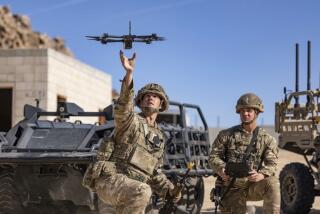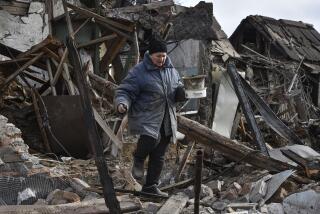Want to Demoralize the Enemy? Air Power Alone Isn’t Enough : Warfare: Theories that strategic bombing can break the other side are just that. Look at what happened during World War II or Vietnam.
- Share via
WASHINGTON — The showdown in the Persian Gulf has catalyzed the debate over the role of air power in warfare. The United States cannot match the Iraqi army man-for-man, let alone obtain the 3-1 odds military theory deems necessary for offensive success. Instead, U.S. military leaders hope to mass enough high-tech weaponry in the gulf to destroy Saddam Hussein’s favorite police instrument--his military--in a short air campaign. Pundits in the media and on the Hill echo assertions made until last week by Air Force Chief of Staff Gen. Michael J. Dugan, that “air power is the only answer.”
Such claims are the current version of an argument first voiced by the post-World War I “air-power” theorists. While the United States has amassed an impressive aerial arsenal in the gulf region, the assertion that air power alone could “win” a war against Iraq demands an evaluation of the theories and the evidence that gave birth to that idea.
The contentiousness that surrounds the air-power debate stems largely from the empirical evidence these arguments rely on: the campaigns of World War II, where air power’s performance was uneven. But the theoretical basis for an air-power doctrine goes back to immediately after World War I. The infant air arms of the Great War had no real influence on the outcome. But the ability of bombers to overfly land and seas to drop high explosives on cities and industrial centers had a powerful impact on the thinking of the inter-war air power theorists.
The high-flying bomber appeared to many as the optimal weapon for “total war.” In what had become a predominantly economic-industrial contest, the bomber offered optimistic strategists a weapon to destroy the vital industries that churned out the instruments of war. Thus, the bloody and protracted stalemate of World War I trench warfare could be avoided. Air-power theorists on both sides of the Atlantic were convinced strategic bombing could bring a nation to its knees by targeting material and moral resources.
From the first screams of dive-bombing Stukas, World War II offered a proving ground for the various air-power theories. Yet after an offensive by 3,000 German Luftwaffe aircraft against Britain, four years of night bombing by the RAF Bomber Command and daylight raids by the U.S. Air Force across Germany and the relentless U.S. bombardment of Japan, the debate over the effectiveness of strategic air power is unresolved.
Air-power theorists had grossly mistaken the impact that raining tons of high-explosives on civilians would have on a nation’s determination to defeat those responsible for the bombing. Instead of demoralizing England’s will for resistance, Germany’s indiscriminate bombing of population centers bolstered the British nation’s will for victory. The German error in misjudging British national resolve was surpassed only by the RAF Bomber Command’s failure to anticipate that British bombing of Germany would prove equally counterproductive.
If strategic bombing was unsuccessful in demoralizing a nation’s will to fight, its effectiveness in destroying the war effort of either Germany or Japan was even less impressive. Instead of passively accepting annihilation, targeted industries dispersed and decentralized.
One need not read the 321 reports published by the U.S. Strategic Bombing Survey after World War II to realize that the Allied bombing offensive was far from decisive. That is illustrated by German industry production figures. Output doubled from 1942 to 1944 and reached its highest figure in late 1944--at the height of the bombing campaign. The effects of strategic bombing on Japan’s centralized industrial base was equally unimpressive.
The strategic employment of air power since 1945 has only reinforced the conclusions drawn from World War II. The primary achievement of the massive aerial bombardment unleashed against North Vietnam, intended to pressure Hanoi, only stiffened the North’s resolve. Despite dropping thousands of B-52 loads on dense jungle and repeated bombing attacks on roadways in the North, air power was never able to seal off South Vietnam from the infiltration of men and materiel.
The bombing campaign carried out by both sides in the Iran-Iraq War also failed to produce a decisive victory. The employment of missiles targeted against cities had little more impact than German V-1 and V-2 attacks on Britain.
Despite the desultory effects of strategic bombing, air power used in coordination with ground forces exerts a considerable influence. Luftwaffe operations against Poland and France in 1940, and Russia in 1941, were successful when employed with attacking ground forces. During the Allied offensive in France, air power supported the drive on Berlin.
Tactical air operations in the last 40 years have often produced the same results. Air power played a vital role in supporting the attacks of the British ground units in the fighting for the Falklands Islands. In the Arab-Israeli wars, Israel has always achieved air superiority, using aircraft to support the movement of ground forces. Although air power alone cannot win wars, it is also true that the side that does not have air superiority has never won a war.
But the Israelis never use air power as an independent arm--they coordinate air and ground attacks. The Israeli’s realize the fundamental limitation of air power: It cannot seize and hold territory; only ground units can do that. Thus, it is in conjunction with ground forces--to support an advance, or to hamper a retreat-- that air power is most effective.
Advances in technology in the last 20 years have resulted in vast improvements in aircraft armament. Pilots can achieve degrees of accuracy undreamt of by the early air-power theorists. In an air campaign against Iraq, U.S. air attacks would have a devastating effect on exposed supply convoys and ground units.
But technology plays both ways. Air-defense systems have been significantly bolstered by technological improvements. The Arab-Israeli wars have shown that so many aircraft may have to target air defenses that the aircraft will be unable to support the ground forces.
Air power alone will not achieve the stated objective of forcing Hussein to withdraw from Kuwait. Though air power would be a fundamental component of a U.S. offensive, it would have to be in conjunction with ground attacks. Looking to air power as a self-sufficient instrument of victory to avoid American casualties is as illusory as the pre-World War II theory that bombers would obviate the need for large-scale ground warfare.
Twentieth-century warfare has not borne out the ambitions of the original air-power theorists, or of the modern-day adherents to air power as a decisive independent instrument. Air power has never proven to be the sledgehammer that can crush an enemy’s will and ability to conduct war. It is when air-power is integrated as a component of a strategy that combines any number of resources--military, economic, diplomatic--to achieve specified objectives that it makes a real contribution to victory.
More to Read
Sign up for Essential California
The most important California stories and recommendations in your inbox every morning.
You may occasionally receive promotional content from the Los Angeles Times.












